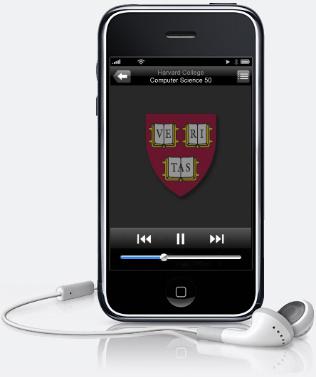하버드대에서 무료로 배우는 컴퓨터학개론 + α
2009-03-14 23:13

하버드대에서 무료로 제공하는 컴퓨터학개론 강좌를 들어보시죠. 전공 초보자와 일반인들에게도 도움이 될 좋은 동영상 강좌를 제공하고 있습니다. 강좌의 이해를 도울 수 있는 슬라이드, 강의노트 및 소스코드 또한 제공되고 있습니다. David Malan 강사가 진행하는 수업에 함께 빠져보시죠. David Malan은 하버드대에서 학사/석사/박사를 마쳤고, 사이버보안과 컴퓨터 법과학(computer forensics)을 연구했다고 하네요. 또한, 2개의 벤처기업도 만들 정도로 왕성한 활동을 하고 있습니다. 이 개론 강좌를 포함해서 다음과 같은 강좌도 공개하고 있습니다. 관심있는 분들은 많은 활용바랍니다.
Introduction to the intellectual enterprises of computer sciences.
Algorithms: design, implementation, analysis. Software development:
abstraction, encapsulations, data structures, debugging, testing.
Architecture of computers: low-level data representation, instructions
processing. Computer Systems: programming languages, compilers,
operating systems, databases. Computers in the real world: networks,
websites, security, forensics, cryptography. This course teaches
students how to think more carefully and how to solve problems more
effectively. Problem sets involve extensive programming in C as well as
PHP and JavaScript.
Algorithms: design, implementation, analysis. Software development:
abstraction, encapsulations, data structures, debugging, testing.
Architecture of computers: low-level data representation, instructions
processing. Computer Systems: programming languages, compilers,
operating systems, databases. Computers in the real world: networks,
websites, security, forensics, cryptography. This course teaches
students how to think more carefully and how to solve problems more
effectively. Problem sets involve extensive programming in C as well as
PHP and JavaScript.
Podcast available at cs50.tv.
This course is all about understanding: understanding what's going on
inside your computer when you flip on the switch, why tech support has
you constantly rebooting your computer, how everything you do on the
Internet can be watched by others, and how your computer can become
infected with a worm just by turning it on. In this course we demystify
computers and the Internet, along with their jargon, so that students
understand not only what they can do with each but also how it all
works and why. Students leave this course armed with a new vocabulary
and equipped for further exploration of computers and the Internet.
Topics include hardware, software, the Internet, multimedia, security,
website development, programming, and dotcoms. This course is designed
both for those with little, if any, computer experience and for those
who use a computer every day.
inside your computer when you flip on the switch, why tech support has
you constantly rebooting your computer, how everything you do on the
Internet can be watched by others, and how your computer can become
infected with a worm just by turning it on. In this course we demystify
computers and the Internet, along with their jargon, so that students
understand not only what they can do with each but also how it all
works and why. Students leave this course armed with a new vocabulary
and equipped for further exploration of computers and the Internet.
Topics include hardware, software, the Internet, multimedia, security,
website development, programming, and dotcoms. This course is designed
both for those with little, if any, computer experience and for those
who use a computer every day.
Podcast available at computerscience1.tv.
This course introduces XML as a key enabling technology in Java-based
applications. Students learn the fundamentals of XML and its
derivatives, including DTD, SVG, XML Schema, XPath, XQuery, XSL-FO, and
XSLT. Students also gain experience with programmatic interfaces to XML
like SAX and DOM, standard APIs like JAXP and TrAX, and
industry-standard software like Ant, Tomcat, Xerces, and Xalan. The
course acquaints students with J2EE, including JavaServer Pages (JSP)
and Java Servlet, and also explores HTTP, SOAP, web services, and WSDL.
The course's projects focus on the implementation and deployment of
these technologies.
applications. Students learn the fundamentals of XML and its
derivatives, including DTD, SVG, XML Schema, XPath, XQuery, XSL-FO, and
XSLT. Students also gain experience with programmatic interfaces to XML
like SAX and DOM, standard APIs like JAXP and TrAX, and
industry-standard software like Ant, Tomcat, Xerces, and Xalan. The
course acquaints students with J2EE, including JavaServer Pages (JSP)
and Java Servlet, and also explores HTTP, SOAP, web services, and WSDL.
The course's projects focus on the implementation and deployment of
these technologies.
Podcast available at computerscience259.tv.
Today's websites are increasingly dynamic. Pages are no longer static
HTML files but instead generated by scripts and database calls. User
interfaces are more seamless, with technologies like Ajax replacing
traditional page reloads. This course teaches students how to build
dynamic websites with Ajax and with Linux, Apache, MySQL, and PHP
(LAMP), one of today's most popular frameworks. Students learn how to
set up domain names with DNS, how to structure pages with XHTML and
CSS, how to program in JavaScript and PHP, how to configure Apache and
MySQL, how to design and query databases with SQL, and how to use Ajax
with both XML and JSON. The course discusses issues of security,
scalability, and cross-browser support.
HTML files but instead generated by scripts and database calls. User
interfaces are more seamless, with technologies like Ajax replacing
traditional page reloads. This course teaches students how to build
dynamic websites with Ajax and with Linux, Apache, MySQL, and PHP
(LAMP), one of today's most popular frameworks. Students learn how to
set up domain names with DNS, how to structure pages with XHTML and
CSS, how to program in JavaScript and PHP, how to configure Apache and
MySQL, how to design and query databases with SQL, and how to use Ajax
with both XML and JSON. The course discusses issues of security,
scalability, and cross-browser support.
Podcast available at cs75.tv.







댓글
여기도 한번 가보세요! 진짜 짱입니다. 하버드, 예일
와우 저도 여기가서 깜짝 놀랐습니다. 한국인이